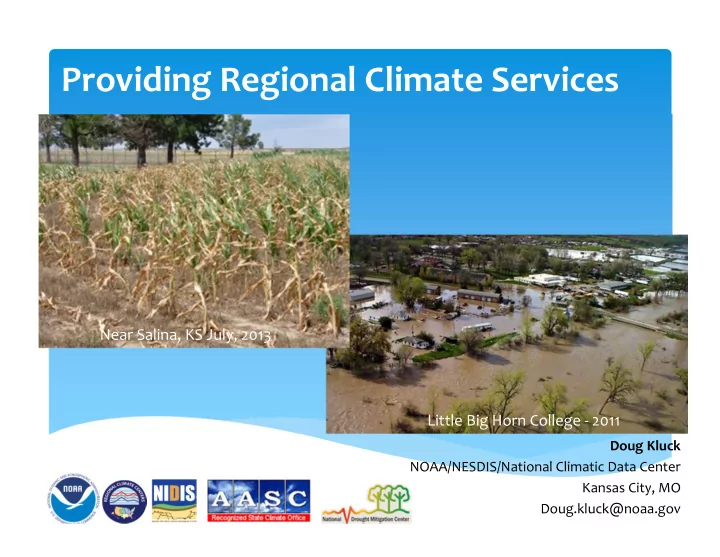

Providing Regional Climate Services Near Salina, KS July, 2013 Little Big Horn College ‐ 2011 Doug Kluck NOAA/NESDIS/National Climatic Data Center Kansas City, MO Doug.kluck@noaa.gov
Regional Climate Services The development and delivery of climate products and services that are on time and spatial scales needed most by decision ‐ makers Development and Delivery: requires and end ‐ to ‐ end iterative system that links research, modeling and assessment activities to product and services development, along with delivery systems and capacity building to help users incorporate new knowledge into their decision making. Products and Services: climate information and decision support tools that expand one’s understanding of risk and impacts and promote identification of adaptation and mitigation options Time and spatial scales : climate impacts are felt closest to home. Users need timely, place ‐ based information on climate risks and impacts in order to make informed decisions. Decision ‐ makers: users of climate information representing all public and private sectors of activity. These are climate stakeholders. credit Eileen Shea
Some Regional Climate Service Fundamentals: Maintain and evaluate relevance – regional/local issues, in touch with what matters Iterative, consistent, continuous, reliable, trustworthy Across time scales – 2 weeks to 100 years Problem ‐ focused approach – understand place & history Avoid reinvention – build on existing relationships and work Joint solutions – work together to solve needs Leverage partnerships & networks – key element for success Recognize capacities – resources (time, funds, experience, knowledge) The process of engagement is as important as the outcome
Key Services Monitoring – value add, trends, anomalies Data – instrumentation, collection, database Prediction – interpret, place/sector based Outreach – inform decisions, accessibility Education – building capacity for understanding Research – applied, useable Linkages – leveraging networks, knowledge and resources
Regional Climate Service Partnerships
Key Federal Partnerships
Climate Resources: ( Federal, States, Tribes, Urban, academic, NGOs, Private Interests) Climate Impacts Monitoring & Forecasting Assessments and Scenarios Regional Climate Services Engaging Preparedness & Communication and Outreach Adaptation
RCS Examples
Building Awareness: Regional Monthly Climate & Drought Webinars Since November 2011 Response to climate extremes Popular w/states, feds, tribes, private interests Presenters: AASC, NDMC, RCCs, USDA, LCC and others Last Updated: 5/30/2012
Webinars: Consistent and all ‐ in ‐ one place from many sources Blend past, present and future climate information Drought, Flood, Fire, Heat, Cold, Agriculture, Snow, soil moisture/temperature, precipitation, temperatures, rivers, reservoirs, etc… Monthly (3 rd Thursday) unless it gets really bad then every other week Sign up here: http://drought.gov/drought/content/regional ‐ programs/regional ‐ drought ‐ webinars Webinars are recorded: http://www.hprcc.unl.edu/webinars.php
Quarterly Sub ‐ Regional Summary & Outlooks Midwest Missouri Basin States Great Lakes Region http://www.drought.gov/drought/content/resources/reports
2014 – El Nino? What does it mean for the Missouri Basin?
Attribution and Assessments Devil’s Lake (ND) Attribution 2007 April Freeze http://www1.ncdc.noaa.gov/pub/data/tech 2011 Flood Attribution Study rpts/tr200801/tech ‐ report ‐ 200801.pdf 2012 Drought Attribution Study http://www.esrl.noaa.gov/psd/csi/factsheets/
2012 Drought Assessment
Engagements & Interactions NIDIS Missouri Basin Tribal Meeting, Rapid City, SD ‐ 2014 15
National Integrated Drought Information System – Missouri Basin • Drought Early Warning System (DEWS) • Informing Planning • Wind River Reservation • States • Federal Agencies • Enhancing Monitoring • Drought/flood • Tribally focused drought meeting • Regional Web Portal http://drought.unl.edu/Portals/0/docs/EPC/MRB%20Feb%202 ‐ 14%20wkshop%202 ‐ pager.pdf
NIDIS Pilots Areas
Other Regional Services North American Climate Services Partnership Canada/U.S. climate focus on Great Lakes Great Lakes Water Quality Agreement – Climate Change Annex Missouri Basin and Midwest Federal Climate Collaborations National Climate Assessment Regional and sector interpretation Information Delivery via Interpretation Synthesizing per audience
Thank You Doug Kluck Regional Climate Services Director (Central Region) Kansas City, MO – NWSTC 816 ‐ 994 ‐ 3008 (O) 816 ‐ 564 ‐ 2417 (C)
Recommend
More recommend